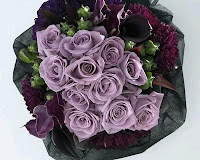 |
| Photo courtesy of Tokyo Nylon Girls |
Perhaps blue M&Ms, which were introduced in 1995, started the love affair with things-that-shouldn’t-be-blue. I, for one, wasn’t in favor of adding blue to the M&M palette (but I seem to eat them just fine now). Blue-dyed poinsettias—some with glitter—have been selling, and selling out, since 2005. It’s positively unnatural!
Speaking of unnatural, earlier this year Silver Vase Inc. introduced Blue Mystique, touting it as the first blue orchid. Similar to the dyed poinsettias, the company website says it is “the result of a patented process that infuses white orchids with a special medium.” Or, in the words of a new label for the orchid “…with a little bit of magic we turn a white orchid blue.” Seems to me, orchids are amazing and enthralling enough without needing to dye them blue (in my opinion anyway).
A blue rose has been the Holy Grail in rose breeding for many. According to Wikipedia’s blue rose entry, “Due to the absence in nature of blue roses, they have come to symbolize mystery and longing to attain the impossible…” But that hasn’t stopped—or perhaps it’s what has encouraged—Japanese company Suntory from introducing a blue rose named Applause. It is touted as the world’s first rose with nearly 100% blue-pigmented petals. The photo that accompanied the recent press release looks mauve(ish) to me, but perhaps that’s because I’m a skeptic. What do you think?
From the Suntory website: “The hue of the dawn sky, with a refined and colorfully refreshing scent, blue rose APPLAUSE captivated the international audience when it first went on sale in Tokyo in 2009. Now, Suntory brings this breathtaking flower to the United States and Canada…the blue rose APPLAUSE will be sold in North America at select florists.” It doesn’t sound like you’ll be able to plant it in your garden any time soon (would you want to?!?!). They go on to say: “Suntory embarked on research with the aim of developing a blue rose in 1990 with their Australian subsidiary, Florigene, now Suntory Flowers. Success was finally achieved in 2004 after introducing a gene for blue pigment from a pansy. In 2009, after nearly two decades of research and developmental work, sales of the blue rose began for the first time.” FYI…it typically takes nine years or so to bring a new rose to market.

